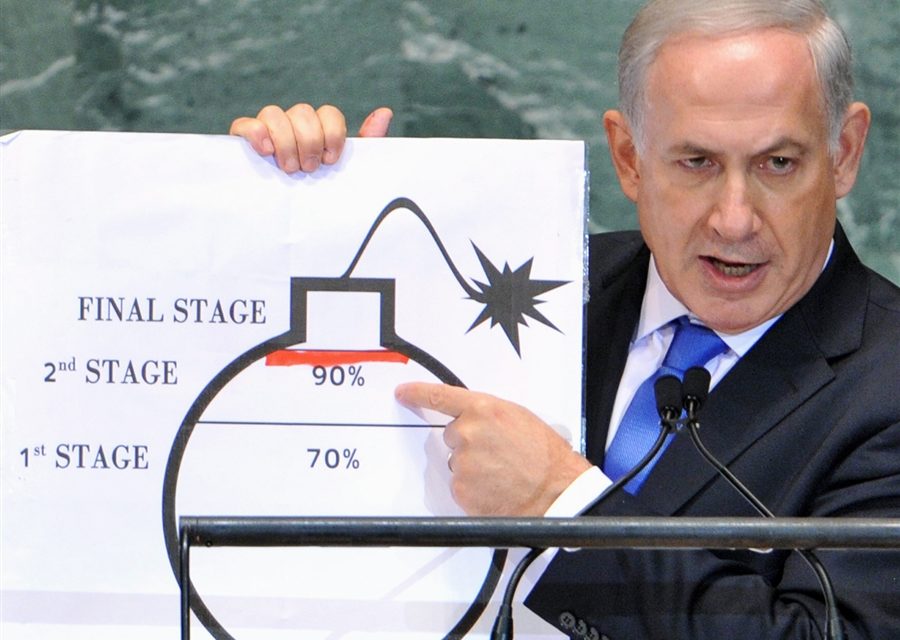It was easy, as Israeli Prime Minister Benjamin Netanyahu addressed the UN on Tuesday, for his critics to ridicule his full-frontal attack on Iran’s President Hassan Rouhani.
There were the sweeping charges linking Rouhani to a series of evil acts: the 1994 bombing of a Jewish community center in Argentina; the 1996 attack on the Khobar Towers complex in Saudi Arabia, killing 19 US servicemen; a 2011 plot to assassinate the Saudi Ambassador to the US.
There was the distortion of the historical record to allege that Rouhani had deceived European negotiators in 2003 so Iran could “advance its nuclear weapons program”.
There were the sometimes strained one-liners: Rouhani as “a wolf in sheep’s clothing” trying to “have his yellowcake and eat it too”.
There was the threat of military action: “Israel will not allow Iran to get nuclear weapons. If Israel is forced to stand alone, Israel will stand alone. ”
There was even the strange pronunciation of Rouhani’s name.
It did not have a single defining image like last year, when Netanyahu held up his Acme cartoon of an Iranian nuclear bomb, but for those lined up against him, the sum of this year’s parts made up an equally-derisory whole.
This was a Netan-yahoo hell-bent against any engagement and way forward with Iran, preferring instead to take the world to military confrontation.
Yes, it was easy to put out Twitter one-liners to top Netanyahu’s attempts, but they doubly missed the point.
First, Netanyahu was setting out a clear strategy, quite distinct from airstrikes. He was saying that the ratcheting-up of sanctions has limited Iran to this point, and there is no reason to stop that escalation.
The Prime Minister never said that regime change is the goal of that strategy, even though for him, it probably is. Instead, he set the objective as “Distrust, dismantle, and verify.”
In other words, rather than negotiations, Iran has to capitulate: until it abandons any nuclear program, the sanctions remain in place.
Second, all the scepticism and disdain for Netanyahu’s remarks cannot sweep away the political reality that many in Israel — not to mention the US Congress and American public — share his viewpoint.
They share his portrayal of Iran as a wrongdoer of the past. They share his fear of Iran as an existential threat of the present. They share his imagery of his grandfather standing up to a mob as an example for today’s Israel “defending itself with the courage of modern Maccabees, developing limitless possibilities for the future”.
Given this — and given that Iran will not meet Netanyahu’s demand to make one-way concessions, let alone give up any enrichment of uranium for all time — what can be done?
There is no way to reassure Netanyahu and those Israelis who agree with him. There is no framework for the nuclear talks that can satisfy him, no room for negotiation — not with Rouhani or any other Iranian Government, given “the dictator known as the Supreme Leader”.
So either the idea of talks is put aside in favor of the ever-escalating sanctions or the negotiations go ahead in defiance of Netanyahu.
Failing an unexpected collapse of the Islamic Republic, the latter option is the only viable one to avoid perpetual conflict. That re-frames the question: how can re-assurance be given to those who share the Israeli Prime Minister’s vision that when “a radical regime with global ambitions gets awesome power, sooner or later its appetite for aggression knows no bounds”?
Ironically, Netanyahu offered the answer to the riddle in his speech when he cited Ronald Reagan’s maxim — before twisting it — “Trust but Verify”.
In 1985 the Reagan Administration entered discussions a Soviet adversary which he had called the “evil empire” only two years earlier. In part, it did that because the Soviet Union had a new leader; in part, it pursued talks because of the draining cost of confrontation; in part, the Administration did so because it saw a Soviet Union under the increasing burden of economic problems.
Four years later, Reagan’s “Trust but Verify” had become reality in a series of nuclear agreements.
All three conditions generally hold in this case, and so does the prospective outcome.
What Netanyahu did not mention is that the Iranians have put a deal on the table. Tehran will limit enrichment to 5% uranium in return for three major steps: recognition of its right to that enrichment, a guaranteed supply of 20% uranium, and a lifting of sanctions. Extensive inspections of Iran’s nuclear facilities, already in place, will continue and possibly be expanded.
The path from proposal to agreement is a long one, of course, but embarking on it addresses Netanyahu’s concern, just as it did Reagan’s in the 1980s.
If you really wish to remove Iran’s “threat”, then it is far easier to do so with a defined agreement limiting and supervising its uranium enrichment. Failing a mysterious “secret site” which somehow avoids detection for months and even years — the implication in Netanyahu’s invocation of North Korea in his speech — that agreement puts a cap on the conflict.
The course of the discussions towards agreement can — and will — be debated.
But while acknowledging that, it should also be acknowledged that Netanyahu’s alternative is clear.
Far from capping the conflict, the line of No Talks continues to escalate the confrontation. The “existential threat” becomes perpetual, both in the spectre of the Islamic Republic and the spectres of the steps that we supposedly must take to defeat it.

